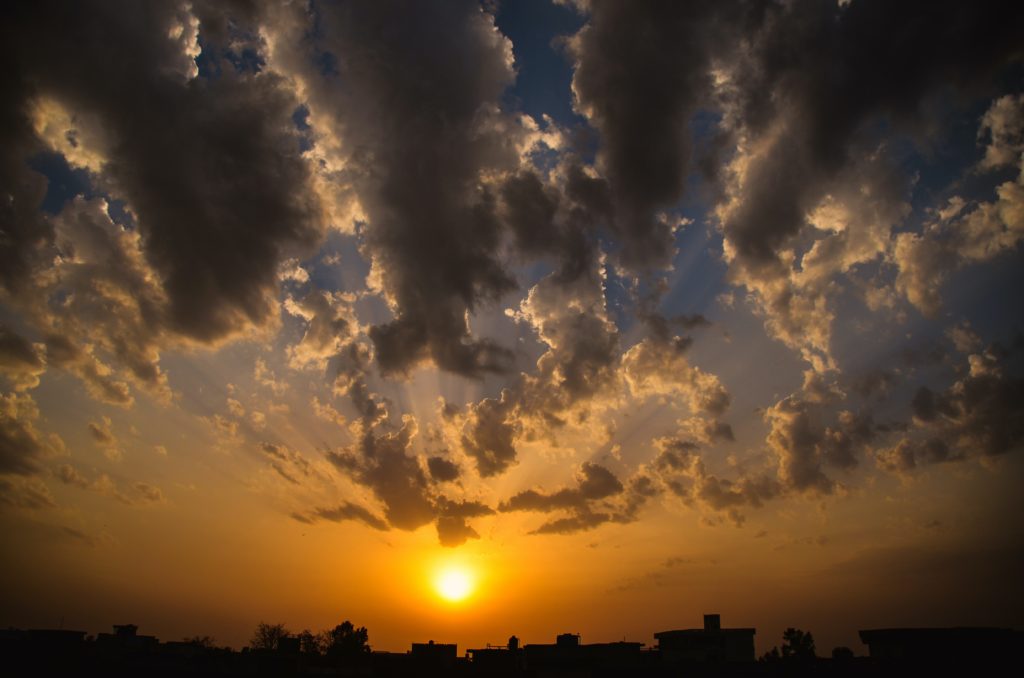
With body temperature regulation being the most important consideration to human survival and learning how to survive in hot weather is key when things go south in hot climates. There is a lot you can do to keep you and your home cool during an event that leaves you without the climate controls we are used to in our modern society. As always, being prepared will make your changes of hot weather survival that much greater.
Stay Out of the Sun
Limiting exposure to direct sunlight is the single most important factor in a hot weather survival situation. If the power is out or you find yourself in a remote location, it’s best to stay inside or in the shade as much as possible. If your survival situation requires you to go out in the sun it’s best to avoid peak times of heat which is usually from late morning to mid afternoon. Make sure to wear light colored clothing (as close to white as possible); this helps reflect infrared radiation keeping you cool in direct sunlight. Try to keep your skin out of the sun as well by covering up with long sleeves and a hat.
Limit Tasks During Peak Hours
Whether you are indoors, in the shade or outdoors, you should limit activities during hot weather survival situations. Over exertion, or even moderate exertion can raise your body temperature and lead to heat exhaustion. It’s easy to get lost in the tasks that a survival situation can demand and heat exhaustion has a way of sneaking up. It’s important to keep your core temperature regulated by limiting most physical tasks to early mornings and nighttime hours. Daytime activities should be limited to those that require little physical movement. And always remember to pace yourself.
Keep Hydrated
Without question, your body will perspire more in hot climates in order to help regulate its temperature. Since you may be losing more fluids you will want to make sure that you are properly hydrated. Estimates from various experts place adequate fluid intake from 11.5 to 15.5, depending on gender and several other factors. Survival situations in hot climates can demand much more hydration. It is advised to drink when you feel thirsty and with water rationing situations aside, this is the best advice for avoiding dehydration.
When learning how to survive in hot weather climates, it may be easy to dismiss the need for hydration in a hot and humid environment, but humidity has a very strong effect on temperature regulation. The human body produces sweat as a process for cooling through a process called evaporative cooling. In high humidity environments the sweat of one’s body doesn’t evaporate which can exacerbate heat exhaustion. Weather in dry or humid climates, always stay hydrated as much as you reasonably can.
Cover Your Windows
Any windows that are facing direct sunlight should be covered. You want to make sure to keep out as much direct sunlight as possible as it will heat up the inside of your home or shelter. You can go a step further and reflect the sunlight from your home by using reflective material such as aluminum foil or automobile sun shades. Anything with a reflective surface will bounce the solar radiation, and therefore heat, away from your home.
Ventilation is Important
The most efficient way of keeping your home or indoor environment cool without any electricity is to make sure you “lock-in” cooler air and push out hot air. This means that your windows should only be open in the cooler parts of the day and at night. So leave your windows open at night and just as the day starts to warm up, shut your windows and doors keeping the cooler air in your house. A little known tip is window and sliding door screens actually block a significant amount of air flow. You can try this experiment out by opening and closing a screen door and you’ll notice much more air flow with an open screen.
Keep Low
As we all know, heat rises. It’s a very elementary observation and one that can be used to your advantage when trying to keep cool in an emergency situation. Without air-conditioning to keep you cool on a hot night you’ll need to be smart about where you spend your time. If you live in a two-story home, you’ll definitely want to stay downstairs. And if you have a basement, you can bet that the family will be sleeping there on a hot summer night without AC.
